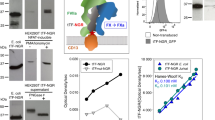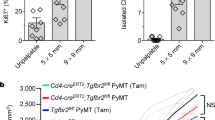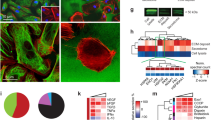Abstract
Tumors must develop an adequate vascular network to meet their increasing demands for nutrition and oxygen. Angiostatin, a multiple kringle (1–4)–containing fragment of plasminogen, is an effective natural inhibitor of tumor angiogenesis. Here we show that gene transfer of angiostatin into small (0.1 cm in diameter) solid EL-4 lymphomas established in syngeneic C57BL/6 mice led to reduced tumor angiogenesis and weak inhibition of tumor growth. In contrast, when angiostatin gene therapy was preceded by in situ gene transfer of the T-cell costimulator B7.1, large (0.4 cm in diameter) tumors were rapidly and completely eradicated, whereas B7.1 and angiostatin monotherapies were ineffective. Combined gene transfer of B7.1 and angiostatin generated potent systemic antitumor immunity that was effective in eradicating a systemic challenge of 107 EL-4 cells. Gene transfer of angiostatin expression plasmids led to overexpression of angiostatin in tumors, increased apoptosis of tumor cells, and decreased density of tumor blood vessels, which may allow the immune system to overcome tumor immune resistance. The latter effects were not the result of a decrease in vascular endothelial growth factor expression, as tumoral vascular endothelial growth factor expression increased slightly after angiostatin gene transfer, presumably in response to increasing hypoxia. These results suggest that combining immunogene therapy with a vascular attack by angiostatin is a particularly effective approach for eliciting antitumor immunity. Cancer Gene Therapy (2001) 8, 719–727
This is a preview of subscription content, access via your institution
Access options
Subscribe to this journal
Receive 12 print issues and online access
$259.00 per year
only $21.58 per issue
Buy this article
- Purchase on Springer Link
- Instant access to full article PDF
Prices may be subject to local taxes which are calculated during checkout
Similar content being viewed by others
References
Oehler MK, Bicknell R . The promise of anti-angiogenic cancer therapy Br J Cancer 2000 82: 749–752
O'Reilly MS, Holmgren L, Shing Y, et al . Angiostatin: a novel angiogenesis inhibitor that mediates the suppression of metastases by a Lewis lung carcinoma Cell 1994 79: 315–328
O'Reilly MS, Holmgren L, Chen C, et al . Angiostatin induces and sustains dormancy of human primary tumours in mice Nat Med 1996 2: 689–692
Boehm T, Folkman J, Browder T, et al . Antiangiogenic therapy of experimental cancer does not induce acquired drug resistance Nature 1997 390: 404–407
Moser TL, Stack MS, Asplin I, et al . Angiostatin binds ATP synthase on the surface of human endothelial cells Proc Natl Acad Sci USA 1999 96: 2811–2816
Holmgren L, O'Reilly MS, Folkman J . Dormancy of micrometastases-balanced proliferation and apoptosis in the presence of angiogenesis suppression Nat Med 1995 1: 149–153
Claesson-Welsh L, Welsh M, Ito N, et al . Angiostatin induces endothelial cell apoptosis and activation of focal adhesion kinase independently of the integrin-binding motif RGD Proc Natl Acad Sci USA 1998 95: 5579–5583
Kirsch M, Strasser J, Allender R, et al . Angiostatin suppresses malignant glioma growth in vivo Cancer Res 1998 58: 4654–4659
Joe YA, Hong YK, Chung DS, et al . Inhibition of human malignant glioma growth in vivo by human recombinant plasminogen kringles 1–3 Int J Cancer 1999 82: 694–699
Redlitz A, Daum G, Sage EH . Angiostatin diminishes activation of the mitogen-activated protein kinase ERK-1 and ERK-2 in human dermal microvascular endothelial cells J Vasc Res 1999 36: 28–34
Ito H, Rovira II, Bloom ML, et al . Endothelial progenitor cells as putative targets for angiostatin Cancer Res 1999 59: 5875–5877
Tanaka T, Cao Y, Folkman J, et al . Viral vector–targeted antiangiogenic gene therapy utilizing angiostatin complementary DNA Cancer Res 1998 58: 3362–3369
Griscelli F, Li H, Griscelli AB, et al . Angiostatin gene transfer: inhibition of tumour growth in vivo by blockage of endothelial cell proliferation associated with a mitosis arrest Proc Natl Acad Sci USA 1998 95: 6367–6372
Gorski DH, Mauceri HJ, Salloum RM, et al . Potentiation of the antitumour effect of ionizing radiation by brief concomitant exposures to angiostatin Cancer Res 1998 58: 5686–5689
Mauceri HJ, Hanna NN, Beckett MA, et al . Combined effects of angiostatin and ionizing radiation in antitumour therapy Nature 1998 394: 287–291
Kanwar JR, Berg RW, Lehnert K, et al . Taking lessons from dendritic cells: multiple xenogeneic ligands for leukocyte integrins have the potential to stimulate anti-tumour immunity Gene Ther 1999 6: 1835–1844
Kanwar JR, Kanwar RK, Pandey S, et al . Vascular attack by 5,6-dimethylxanthenone-4 acetic acid combined with B7.1-mediated immunotherapy overcomes immune resistance and leads to the eradication of large tumours Cancer Res 2000 61: 1948–1956
Sun X, Leung E, Kanwar JR, et al . Gene transfer of antisense hypoxia inducible factor-1α enhances the therapeutic efficacy of cancer immunotherapy Gene Ther 2001 8: 638–645
Cao Y, O'Reilly MS, Marshall B, et al . Expression of angiostatin cDNA in a murine fibrosarcoma suppresses primary tumour growth and produces long-term dormancy of metastases J Clin Invest 1998 101: 1055–1063
Heather ER, Jessica L, Randall SJ . HIF-1α is required for solid tumour formation and embryonic vascularization EMBO J 1998 17: 3005–3015
Kayar SR, Archer PG, Lechher AJ, Banchero N . Evaluation of the concentric-circles method for estimating capillary–tissue diffusion distances Microvasc Res 1982 24: 342–353
Maxwell PH, Dachs GU, Gleadle JM, et al . Hypoxia-inducible factor-1 modulates gene expression in solid tumors and influences both angiogenesis and tumor growth Proc Natl Acad Sci USA 1997 94: 8104–8109
Baguley BC, Ching LM . Immunomodulatory actions of xanthenone anticancer agents BioDrugs 1997 8: 119–127
Pedley RB, Boden JA, Boden R, et al . Ablation of colorectal xenografts with combined radioimmunotherapy and tumor blood flow–modifying agents Cancer Res 1996 56: 3293–3300
Finlay GJ, Ching LM, Wilson WR, et al . Resistance of cultured Lewis lung carcinoma cell lines to tiazofurin J Natl Cancer Inst 1987 79: 291–296
Drixler TA, Rinkes IH, Ritchie ED, et al . Continuous administration of angiostatin inhibits accelerated growth of colorectal liver metastases after partial hepatectomy Cancer Res 2000 60: 1761–1765
Chen Q-R, Kumar D, Stass SA, et al . Liposomes complexed to plasmids encoding angiostatin and endostatin inhibit breast cancer in nude mice Cancer Res 1999 59: 3308–3312
Sacco MG, Caniatti M, Cato EM, et al . Liposome-delivered angiostatin strongly inhibits tumor growth and metastatization in a transgenic model of spontaneous breast cancer Cancer Res 2000 60: 2660–2665
Ambs S, Dennis S, Fairman J, et al . Inhibition of tumor growth correlates with the expression level of a human angiostatin transgene in transfected B16F10 melanoma cells Cancer Res 1999 59: 5773–5777
Blezinger P, Wang J, Gondo M. et al . Systemic inhibition of tumour growth and tumour metastases by intramuscular administration of the endostatin gene Nat Biotechnol 1999 17: 343–348
Lucas R, Holmgren L, Garcia I, et al . Multiple forms of angiostatin induce apoptosis in endothelial cells Blood 1998 92: 4730–4741
Ferrara N, Houk L, Jakeman L, et al . Molecular and biological properties of the vascular endothelial cell growth factor family of proteins Endocr Rev 1992 13: 18–32
Borgstrom P, Killan KJ, Sriramarao P, et al . Complete inhibition of angiogenesis and growth of microtumours by anti-vascular endothelial growth factor neutralizing antibody: novel concepts of angiostatic therapy from intravital video microscopy Cancer Res 1996 56: 4032–4039
Saleh M, Stacker SA, Wilks AF . Inhibition of growth of C6 glioma cells in vivo by expression of antisense vascular endothelial growth factor sequence Cancer Res 1996 56: 393–401
Millaruer B, Shawver LK, Plate KH, et al . Glioblastoma growth inhibited in vivo by a dominant-negative Flk-1 mutant Nature 1994 367: 576–579
Hanahan D, Folkman J . Patterns and emerging mechanisms of the angiogenic switch during tumorigenesis Cell 1996 86: 353–364
Folkman J . Angiogenesis in cancer, vascular, rheumatoid and other disease Nat Med 1995 1: 27–31
Ding I, Sun JZ, Fenton B, et al . Intratumoral administration of endostatin plasmid inhibits vascular growth and perfusion in Mca-4 mammary carcinomas Cancer Res 2001 61: 526–531
Acknowledgements
This work was supported, in part, by grants from the World Health Organization, the Wellcome Trust, the Royal Society of New Zealand, the Cancer Society of New Zealand, the Health Research Council of New Zealand, the Lottery Grants Board of New Zealand, and the Maurice and Phyllis Paykel Trust.
Author information
Authors and Affiliations
Corresponding author
Rights and permissions
About this article
Cite this article
Sun, X., Kanwar, J., Leung, E. et al. Angiostatin enhances B7.1-mediated cancer immunotherapy independently of effects on vascular endothelial growth factor expression. Cancer Gene Ther 8, 719–727 (2001). https://doi.org/10.1038/sj.cgt.7700370
Received:
Published:
Issue Date:
DOI: https://doi.org/10.1038/sj.cgt.7700370
Keywords
This article is cited by
-
Anti-tumoural effects of PlgK1-5 are directly linked to reduced ICAM expression, resulting in hepatoma cell apoptosis
International Journal of Colorectal Disease (2012)
-
Antisense HIF-1α prevents acquired tumor resistance to angiostatin gene therapy
Cancer Gene Therapy (2010)
-
Intramuscular delivery of antiangiogenic genes suppresses secondary metastases after removal of primary tumors
Cancer Gene Therapy (2005)
-
Requirements for ICAM-1 immunogene therapy of lymphoma
Cancer Gene Therapy (2003)
-
Regression of solid tumors by engineered overexpression of von Hippel–Lindau tumor suppressor protein and antisense hypoxia-inducible factor-1α
Gene Therapy (2003)



